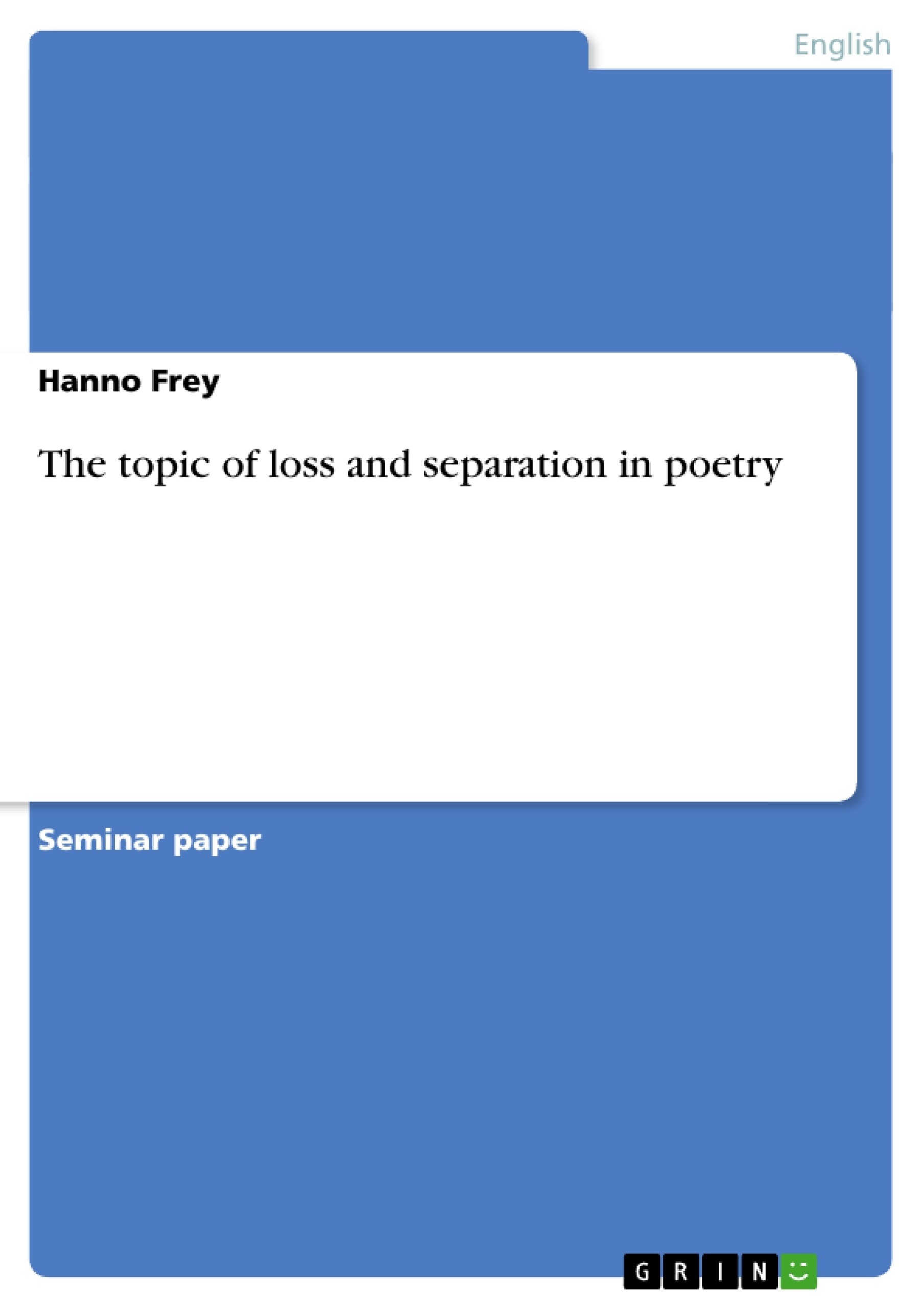As the title suggests, this term paper deals with the topic of loss and separation in poetry. The texts which have been chosen as relevant material are the poems “THE BREAK AWAY ” by Anne Sexton, “SHE IS AWAY” by Kenneth Rexroth and “RIVER ROAD” by Stanley Kunitz1. These three poems center around the same problem but they differ not only in the perspective of the lyrical I2 but also in certain stylistic devices. It is the aim of this term paper to point some of these differences out and to describe the concept of loss and separation, i.e.: how loss and separation are perceived in each case by the lyrical I. In this context it should be mentioned that not all relevant elements of each poem can be taken into consideration- doing so would go beyond the scope of this term paper3. Consequently, the main idea is to present some basic ideas.
In some cases it will be necessary to look at certain parts of a poem in great detail. There will also be some autobiographical references to the lives of the authors – mainly to Anne Sexton and Kenneth Rexroth as only very few material has been available about Stanley Kunitz. In doing so the reader must be aware of the fact that the poems do surely not present totally autobiographical experiences- nevertheless it seems to be quite impossible to strictly keep these out of them.
Inhaltsverzeichnis (Table of Contents)
- 1 Introduction
- 2 Analysis of three poems
- 2.1 Anne Sexton: “THE BREAK AWAY”
- 2.2 Kenneth Rexroth: “SHE IS AWAY”
- 2.3 Stanley Kunitz: “RIVER ROAD”
- 3 Conclusion
Zielsetzung und Themenschwerpunkte (Objectives and Key Themes)
This term paper explores the theme of loss and separation in poetry, specifically focusing on three poems: “THE BREAK AWAY” by Anne Sexton, “SHE IS AWAY” by Kenneth Rexroth, and “RIVER ROAD” by Stanley Kunitz. The paper aims to analyze the poems' treatment of loss and separation, examining the lyrical I's perspective, stylistic devices, and the impact of autobiographical references on the poems' interpretation.
- Loss and separation in poetry
- Analysis of the lyrical I's perspective
- Stylistic devices employed in the poems
- Autobiographical references and their influence
- The portrayal of emotional states related to loss and separation
Zusammenfassung der Kapitel (Chapter Summaries)
- Introduction: This chapter introduces the topic of the paper, focusing on loss and separation in poetry. It outlines the three poems chosen for analysis and their common themes while highlighting their stylistic differences. The chapter emphasizes the aim of exploring the concept of loss and separation as perceived by the lyrical I in each poem.
- Analysis of three poems: This chapter delves into the analysis of the three selected poems.
- Anne Sexton: “THE BREAK AWAY”: This section examines Anne Sexton's poem “THE BREAK AWAY,” focusing on the lyrical I's portrayal of a broken marriage and the complex emotions of fear, hope, happiness, and sadness. It analyzes the poem's imagery of death and destruction, highlighting the lyrical I's struggle to cope with the separation.
- Kenneth Rexroth: “SHE IS AWAY”: This section analyzes Kenneth Rexroth's poem “SHE IS AWAY,” focusing on the lyrical I's perspective on the absence of the beloved. It examines the stylistic devices employed in the poem and explores the themes of longing, memory, and the enduring nature of love.
- Stanley Kunitz: “RIVER ROAD”: This section examines Stanley Kunitz's poem “RIVER ROAD,” focusing on the lyrical I's journey through a landscape that mirrors the internal landscape of loss and remembrance. It analyzes the poem's symbolic elements and explores the themes of mortality, reconciliation, and the enduring power of nature.
Schlüsselwörter (Keywords)
The key themes and concepts explored in this term paper include loss, separation, lyrical I, stylistic devices, autobiographical references, emotional states, marriage, divorce, absence, longing, memory, love, mortality, reconciliation, nature, and the enduring power of poetry.
- Quote paper
- Hanno Frey (Author), 2000, The topic of loss and separation in poetry, Munich, GRIN Verlag, https://www.grin.com/document/11813




